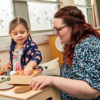




Want to make a real difference to young children and their families? This is where you start.
With a team of highly respected and experienced tutors, who are all experts in their specialisms, you’ll learn from some of the best in the field. This rewarding, flexible degree has babies and young children at its heart. It draws on subjects such as education, health studies, social work and social policy, psychology and sociology.
You’ll experience work-based placements in a range of early childhood settings. And gain the skills you need to move into the early years workforce.
About this course
This degree takes a holistic approach to the development of young children, from birth to the age of eight.
From climate change, global pandemics and economic austerity to screen use and social media, the 21st century has brought many factors that are shaping childhood experiences. This course teaches you to understand the challenges of supporting children and babies in this rapidly changing world, and the skills to respond to them.
Develop practical skills within a range of early years environments – from nurseries to care farms – thanks to our links with over 600 education institutions across the UK. Your training will include outdoor play and learning opportunities and the chance to study towards an accredited Forest School certification, and you could experience a placement overseas. This gives you a valuable additional qualification and the ability to take into account a range of extra needs.
We’re proud to be part of the Early Childhood Studies Degree Network, which benefits students through events and profile-raising activity. You’ll also have the opportunity to achieve Graduate Practitioner Status.
Want to change lives? Start with yours.
Module options
Each year, you’ll study modules worth a certain number of credits, and you need 120 credits per year. Most modules are 20 credits – so you’ll study six modules each year. Some longer modules, such as a dissertation, are worth more. In these cases, you’ll study fewer modules - but the number of credits will always add up to 120. Some modules are compulsory, some are optional, so you can build a course that’s right for you.
Filters
Play Matters
How do adults and environments in early years settings support young children’s learning? In this module you will explore the power that play and everyday experiences have on the development of babies and young children. You will reflect on the role you and others have in supporting them to make sense of the world.
compulsory
20 credits
Children’s Health and Wellbeing
The significance of good physical, emotional and mental health has never been more important for children and society. In this module you will explore the role of practitioners in supporting the health and wellbeing of young children and babies.
compulsory
20 credits
Ethical Dilemmas and the Moral Maze
Dealing with real-world, ethical, or moral dilemmas is both challenging and pertinent to all areas of lived experience and professional, practice. The module will introduce you to a range of theoretical models and provide opportunities to explore these in relation to real world ethical dilemmas drawn from professional practice contexts.
compulsory
20 credits
Professional Practice 1 - The Developing Practitioner
Your introduction to professional placement practice, this module will provide you with the the opportunity to apply theoretical knowledge in a practical context and reflect on your experiences to inform future practice.
compulsory
20 credits
The Wonder Years- Early Child Development 0-8
You will be introduced to the evidence based principles of of child development. Giving due consideration to play and learning, children’s rights, diversity, equity and inclusion, this module supports students to apply theoretical perspectives to practice situations.
compulsory
20 credits
Equality, Diversity and Inclusion
This engaging module provides foundation knowledge and skills that will enable you to develop understanding and analysis of social inequalities and the nature of discrimination in contemporary society. There will be opportunities to explore key equality legislation and policy. The module will explore the ethical and political rationale for developing equitable, diverse, and inclusive practices as part of an agenda for social justice and social change.
compulsory
20 credits
Safeguarding and Family Support
You'll consider the historical and social context of safeguarding and child protection, examining key issues of safeguarding practice including communication, leadership and multi-disciplinary working.
compulsory
20 credits
Working Therapeutically and Inclusively with Children with SEND
This exciting module enables you to consider how you might work more effectively and inclusively with children and young people who have Special Educational Needs Disabilities. You will be able to develop hands-on practical experience with therapeutic approaches such as play therapy, life story work and Lego therapy.
compulsory
20 credits
Global Constructions of Early Childhood
By encouraging you to develop your knowledge and understanding of the lived experience of childhood in different parts of the world, this module will focus on exploring what childhood is, how it has changed over time and how it is viewed in legal, social and cultural terms.
compulsory
20 credits
Our facilities



Watchlist
Kerrie Lee
Course overview
1 min
Life on campus
University life
2 mins
The Gold Standard for Teaching
University life
1 min
Rewilding Reading
Course Highlight
9 mins
Featured academics
Our team of highly respected and experienced tutors are all experts in their specialisms.
Taught by a team of experts in the fields of education, social care, health, inclusion and therapeutic approaches, you’ll gain real, practical knowledge that will be invaluable in your future career.

Dr Jo Traunter
Team Lead
Jo’s teaching and research interests are in early childhood education and care. She brings over 20 years’ experience of different early years teaching methods and activities to her role as Head of Subject for Education, Childhood and Youth Studies.

Kerrie Lee
Lecturer
An experienced early years practitioner, Kerrie's research focuses on how environment, space and place interact and shape the lives of young people. She is working on a consultation for new projects to support early years in museums and galleries.
Entry Requirements
What do I need?
This course is currently available through Clearing, which means our entry requirements are a bit different to what they would normally be.
At Hull, you're a name not a number. During Clearing, we look at all of your qualifications and experience, not just your academic grades. We may be able to offer you a place whatever your situation. Get started by completing our eligibility checker, and find out immediately if you could study at the University of Hull.
Have questions? Our admissions team will be happy to help.
Fees & Funding
How much is it?

Future prospects
Our degrees reflect the high demand for well-trained practitioners and are tailored to prepare you to move straight into employment.
With a focus on the key skills valued by employers we’ll support your development into a practitioner for the early childhood sector. You’ll gain experience of working independently and in teams as well as presentation skills and an ability to articulate effectively across a range of contexts with a variety of tools.
The opportunities for graduates in children’s and young people’s services are varied and wide. Potential future careers include Portage worker, community nursery nurse, children’s centre practitioner, family support worker, early years practitioner and child support worker.
Become part of the next generation of futuremakers
Like what you've seen? Then it's time to apply.
The standard way is to apply through UCAS. This will give you the chance to showcase your skills qualities and passion for the subject, as well as providing us with your academic qualifications.
Not ready to apply yet?
Visit our next Open Day, and see all that the University of Hull has to offer. Talk to our lecturers about your subject, find out what university is really like from our current students, and take a tour of our beautiful campus and amazing facilities.
You may also be interested in...
90% employability (Education Studies) UK domicile full-time first degree leavers; Higher Education Graduate Outcomes statistics, for the academic year 2022/23, published by the Higher Education Statistics Agency June 2025.
Education is ranked Joint 1st in the UK for Value Added Score. The Guardian University Rankings 2026.
Childhood and Youth Studies: 1st in the UK for academic support. National Student Survey (NSS) 2025, HEIs only.
All modules presented on this course page are subject to availability and this list may change at any time.